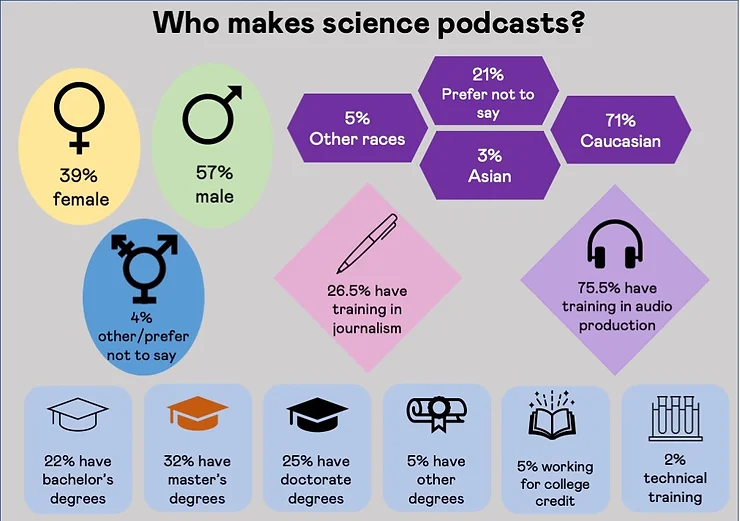Who is making science podcasts and what do they hope to achieve?
By Megan Widdows
Title: “Listening” to Science: Science Podcasters’ View and Practice in Strategic Science Communication
Author(s) and Year: Yuan S, Kanthawala S & Ott-Fulmore T (2022)
Journal: Science Communication (closed access)
| TL;DR: Scientific podcasts are a popular, and relatively new, tool for communicating science. They are produced by people with a variety of scientific backgrounds with largely similar goals: to value science and help people to make evidence-based decisions based on science. Why I choose this paper: I’m an avid listener of podcasts and love that they seem to be facilitating a wider engagement with science beyond typical audiences. I thought flipping the switch and understanding what the makers of podcasts are hoping to achieve was a new interesting take on this emerging field. |
Podcasts have been booming in recent years, and unsurprisingly, so has the number of science communication podcasts. Combine this with the increased public interest in science that we’ve seen over the past few years, and we have a clear new communication channel for talking about science. In fact, recent figures put the number of science communication podcasts alone at close to one thousand.
As a relatively new means of communication, we’ve yet to have a comprehensive understanding of podcasts as a tool for science communication. There are lots of questions left unanswered!
So, what do we already know? One of the most exciting things about podcasts is that they’re the perfect communication tool for modern life. Rather than expecting people to set aside time for dedicated learning, podcasts allow people to listen and learn on the go. Whilst you might think that this would lead to lower levels in engagement in the content, in fact the opposite is true. Research suggests that audiences exhibit significantly greater levels of physiological arousal when listening compared to reading text on a website.
We’ve started to understand what podcast listeners are hoping to achieve. Of course, this is critical in ensuring we’re producing content that people are looking for and will enjoy. But what about their hosts? What are the hopes, aspirations, and ambitions of science communication podcast producers? And how do they go about achieving them?
We’re looking at two key questions:
- How do science podcasters prioritise (a) societal goals and (b) personal goals in their podcast programs?
- How do science podcasters prioritise communication objectives in their programs?
To answer these questions, the researchers, Yuan et al., asked popular science podcasters to answer a survey.
Who’s making science podcasts?
First of all, let’s dig into who makes science podcasts. The results, summarised in the infographic below, show there’s a relatively large variety of people making science podcasts, of varying backgrounds. Although the overall demographic statistics of science podcast hosts align with typical podcast production in the United States, encouraging production from even more diverse backgrounds would ensure a wider variety in the voices being heard.

What were science podcasters’ goals and objectives?
As expected, podcasters had different goals and priorities for their podcasts. In general, they fell into two different categories: personal and societal.
Overall, podcasters’ top priority goal was “valuing science” and serves as a reminder that science communication through podcasts is a less traditional form of education. By focusing on valuing science, the researchers believe that podcasts can reinforce good scientific values and may help to reinstate better public trust in science and continue moving away from the idea that more knowledge alone more knowledge alone will result in an audience with a more positive belief of science.
The survey also found that podcasters’ second top goal was “using science to make decisions.” To achieve this goal, podcasts should be tailored to their intended audience in a practical way so listeners can both learn the information and use it to make sound decisions.
Personal goals of note included “meet[ing] other podcasters or science communicators” as well as “personal enjoyment.” Considering the personal goals of science podcasters will help to ensure their engagement and continued production.
Why is this research important?
Scientific podcasts are a popular and relatively new tool for communicating science. Understanding who chooses to produce these podcasts, and why, will contribute to understanding how best to increase engagement with producers and listeners alike, thereby contributing to the overall personal and societal goals of science podcasters.
If the current trends continue, science podcasts will likely grow in popularity and number in the coming years. Understanding the goals and objectives of podcasters can help to develop ideas, frameworks, and a “gold standard” of advice on how best to communicate science via podcasts whilst still meeting podcasters personal goals.
Edited by Tony Van Witsen and Stephanie Deppe
Feature image credit: Maciej Korsan via snapstock.io under CC0 1.0

